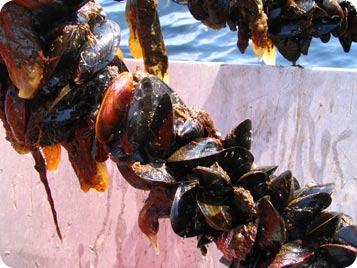 Farmed mussels attached to a growing rope. Credit: SeaChoice
Farmed mussels attached to a growing rope. Credit: SeaChoiceKnown as suspended culture, this low-impact system of mussel farming cultivates mussels on ropes, which are attached to a long line anchored to the sea floor. The line holds the mussel-encrusted ropes at a depth of 30 to 40 feet, where mussels are safe from hungry birds at the surface, as well as from starfish lurking on the sea floor. To avoid the boat traffic and delicate habitats found near coasts, mussel farms can be stationed several miles offshore.
Mussel cultivation begins when free-floating larvae in the water attach themselves to special collection ropes.
These baby mussels, known as spat, are then transferred to “grow-out” ropes, where they remain until they reach harvest size in about 12 to 18 months. The filter-feeding mussels extract plankton and other organic matter from the ocean currents that sweep over them, converting the nutrients into the sweet, juicy flesh prized by seafood lovers. As filter feeders, mussels don’t need fish meal or other food, as some farmed fish species do. Mussels can even improve water quality by reducing excess organic matter in the water column.
Aquaculture researchers are keeping tabs on suspended culture mussel farms to see how they might affect local water quality and surrounding habitats over time. But for now, shellfish lovers can enjoy farmed mussels knowing they are one of the most environmentally sound seafood choices.


